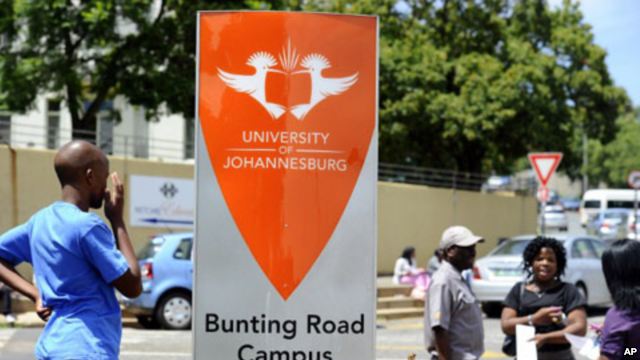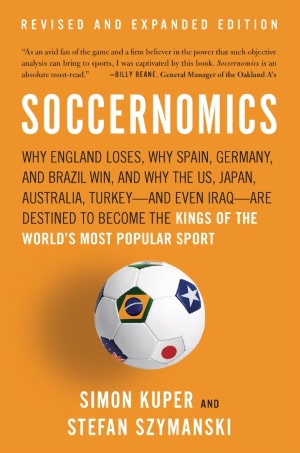
Soccernomics has been called “the Barcelona of football books” and the “Moneyball of soccer.” On Tuesday, April 16, the Football Scholars Forum discussed this influential book with the authors Stefan Szymanski (in East Lansing, Michigan) and Simon Kuper (via Skype). One of the most important questions asked was: How does the introduction of big data and “soccer analytics” change our understanding of fútbol clubs, fans, and nations? The forum also featured intriguing comparisons between Western Europe and the United States.
Joining the authors were: Andrew Guest, Brian Bunk, Christoph Wagner, Corry Cropper, David Kilpatrick, James Dorsey, Mark Siegel, Hikabwa Chipande, Christian Orlic, Benjamin Dettmar, Peter Demopoulos, Steven Apostolov, Tom McCabe, Alex Galarza, and me.
For Twitter timeline click here.
Listen to the audio from the session here (mp3).
Category: Fútbology
Next month the University of Johannesburg is hosting an exciting “Research Forum on South African Football.” Organized by the UJ Department of Sport and Movement Studies, the gathering will consider three papers that address socio-historical, sociological, and developmental aspects of football in South Africa, as well as broader issues related to the local game.
In his paper “Professional Football in Apartheid South Africa: Leisure, Consumption and Identity in the National Football League, 1959-1977,” sociologist Chris Bolsmann (Aston University) will present a preliminary analysis of the NFL, a “whites-only” league established in 1959 by a group of (white) Johannesburg businessmen. Playing in segregated stadiums, the NFL introduced professional football to South Africa. At the height of its popularity, it had two divisions, attracted significant corporate sponsorship, and recruited prominent foreign players, such as George Best and Bobby Charlton. The NFL became the leisure and sporting entertainment of choice for significant numbers of black and white South Africans and was unparalleled in popularity during this period.
Ethnographer Marc Fletcher (Department of Sociology, University of Johannesburg) will explore contemporary dynamics in a paper titled “Divisions, Difference and Encounters in Johannesburg Soccer Fandom.” This ethnography of Kaizer Chiefs, Bidvest Wits, and Manchester United supporters’ clubs in the city shows how supporters on the margins of these groups began to engage with the other, crossed racial and class divisions, and thus reinterpreted their understanding of soccer fandom and their wider experiences of everyday life in the city.
Last but not least, Chris Fortuin (Department of Sport and Movement Studies, University of Johannesburg) will discuss “Youth Football Development in South Africa.” The paper notes how in South Africa there is a severe lack of focus on youth football development to sustain national junior and senior teams. I also highlights that youth football development is not coordinated, there is limited success in nurturing young players for the international market, and coach development with a specific focus on youth football is strongly lacking.
This forum takes place on April 19, 2013, 10:00-12:00 at the University of Johannesburg’s Protea Auditorium, School of Hospitality and Tourism, Bunting Road Campus, Auckland Park. For more details please contact Dr. Chris Bolsmann (chris [dot] bolsmann [AT] aston [dot] ac [dot] uk or @ChrisBolsmann on Twitter).
In this video, Alex Galarza and I discuss digital fútbol scholarship at Michigan State University. The conversation ranges from Galarza’s doctoral dissertation entitled “Between Civic Association and Mass Consumption: The Soccer Clubs of Buenos Aires,” to the Football Scholars Forum, the online football think tank.
For more information about Galarza’s research click here.
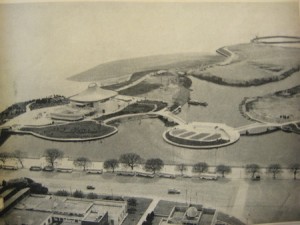 Alex Galarza, a PhD student in history at Michigan State University and co-founder of the Football Scholars Forum, has been awarded the João Havelange Research Scholarship. This prestigious award is administered jointly by FIFA and CIES (Centre International d’Etude du Sport), an independent research center created in 1995 by the governing body in collaboration with the University of Neuchâtel, and the City and State of Neuchatel, Switzerland.
Alex Galarza, a PhD student in history at Michigan State University and co-founder of the Football Scholars Forum, has been awarded the João Havelange Research Scholarship. This prestigious award is administered jointly by FIFA and CIES (Centre International d’Etude du Sport), an independent research center created in 1995 by the governing body in collaboration with the University of Neuchâtel, and the City and State of Neuchatel, Switzerland.
Galarza’s project is titled “Between Civic Association and Mass Consumption: The Soccer Clubs of Buenos Aires.” It explores how clubs developed as both centers of mass spectacle and sites of everyday urban sociability. Club members and officials used political connections to secure city space and public subsidies for stadiums and the overall success of their professional teams. While clubs became centers of patronage and spectacle, they were also non-profit civic associations central to social and cultural activities in the city. Clubs provided educational facilities, libraries, leisure space, and political forums for their members.
Galarza’s research examines the tensions within football clubs during the mid-twentieth century, an era when Argentine society entered a period of deep economic and political changes following the ouster of Juan Domingo Perón in 1955. Perón’s project aimed at developing a new kind of citizen and civic culture in which the popular classes would have a greater political voice and heightened access to new forms of mass consumption. Mass political participation and consumption remained critical and unresolved tensions during the democratic and military governments that followed. One powerful example of how soccer clubs gave shape and meaning to civic engagement, popular spectacle, and mass consumption is Boca Juniors’ Ciudad Deportiva (in photo above). This failed project was a mix between a stadium complex and amusement park, built over seven artificial islands on sixty hectares of land filled in the Rio de la Plata.
Click here to read a digital version of Galarza’s preliminary work on the fascinating history of the Ciudad Deportiva.
Check back with us for an interview with Galarza in the coming days.
Fútbologia: Talking Football in Bologna
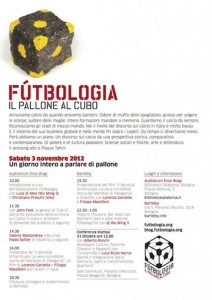
I caught the football virus early on in life. Growing up in Rome, some of my earliest memories of pure freedom and unadulterated joy had to do with playing football with my brothers, friends, and school mates in courtyards, playgrounds, streets and on the dirt and gravel pitches of Villa Ada and Villa Borghese. Eventually, I made it into the CONI Acqua Acetosa football academy, which in the 1970s was a bountiful feeder program for youth development programs across the city, including Roma and Lazio.
This was around the time of the Iranian Revolution and the U.S. Embassy hostage crisis (go see Argo if you haven’t yet). When our creative writing teacher demanded an essay on a global topic, I cheekily produced a (handwritten) lengthy fiction piece about an Iran vs. U.S. “peace match” in Tehran. I coreographed it tightly. President Carter and Ayatollah Khomeini sat next to each other in the VIP seats (!) and at the end of the match the unifying power of sport resolved the diplomatic crisis. Nothing like a young boy’s idealism and imagination!
These childhood memories were suddenly stirred up when I learned about “Fútbologia 2012” — a day-long gathering to be held in Bologna on Saturday, November 3. John Foot, lecturer in Italian history at the University of London and author of Calcio: A History of Italian Football will give a keynote address (follow him on Twitter @footymac) based on his book and the evolution of football writing in Italy and abroad.
I liked the emotional, unpretentious prose of the event’s official description, as well as its philosophical thrust. “We sniff football from when we are kids. The smell of mold in the dressing room, shoe polish, sweaty uniforms,” write the Fútbologia organizers. “Entire lineups memorized. We watch football since forever. We recognize stadiums from around the world. And yet the level of discourse on football in Italy is very modest. And its global business system is in deep shit. We’ve been having less fun for quite some time. But now we have a plan. A conversation about football from a historical perspective, comparative and contemporary. About power and popular culture. Social sciences and physical sciences, art and literature. High pressing and Tahrir Square.”
Now that’s what I call a Saturday well spent. Buon divertimento!
For more information visit the futbologia.org blog.
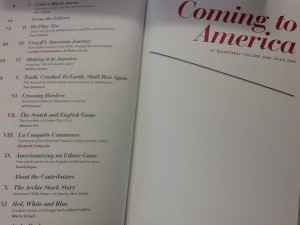 “Neither magazine nor book, but somewhere in between,” is how journalist and author Jonathan Wilson describes the genre of long-form football writing currently gaining popularity in the United States and Britain. I call this genre the bookzine, a hybrid form that lies at the intersection of academia and popular journalism.
“Neither magazine nor book, but somewhere in between,” is how journalist and author Jonathan Wilson describes the genre of long-form football writing currently gaining popularity in the United States and Britain. I call this genre the bookzine, a hybrid form that lies at the intersection of academia and popular journalism.
In an insightful article at Forbes.com, Zach Slaton notes how in September 2012 “three English-language print publications – XI Quarterly, The Blizzard, and Howler – either debuted or had their latest issue released all within a month of each other.” Each of the three magazines has a distinct style, edge, form, and funding model. Published in both print and digital editions, XI Quarterly and The Blizzard are more narrative and non-commercial than Howler, which emphasizes visual graphics and has a deal with Nike. “We’re embarking on a golden age for such writing,” Slaton writes, one “that may just be sustainable given the niches each one fills.”
The main triggers powering this new trend, according to Slaton, are “the globalization of the game and the tearing down of historical publishing structures.” He’s right, of course, as satellite and cable television, Web publishing, video and audio streaming online, Facebook, and Twitter expanded access for soccer junkies almost everywhere.
Having spent almost twenty years as a sort of football academic, I wonder why this supposed “golden era” is happening right now. Are there some deeper, longer-term factors fueling this sudden explosion of bookzines?
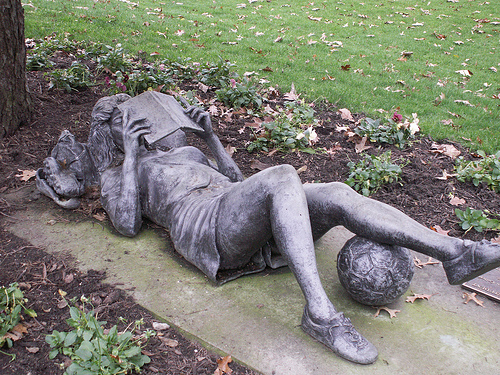 The Football Scholars Forum is an online academic book club based in the History Department at Michigan State University. (I’m one of the founders.) The production and sharing of knowledge and ideas in an open-access platform drives this international community.
The Football Scholars Forum is an online academic book club based in the History Department at Michigan State University. (I’m one of the founders.) The production and sharing of knowledge and ideas in an open-access platform drives this international community.
One of the Forum’s most valuable resources is a series of occasional posts by Andrew Guest entitled “A First Eleven” (not “The Best Eleven”). These brilliant posts provide an eclectic collection of links to and notes about work and events related to the beautiful game. Check out the summer 2012 installment here.
Previous “First Eleven” posts are here, here, and here.
